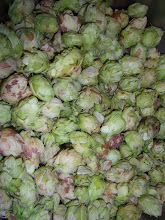 been intending to use them in my first attempt at mead. Well, it looks like Captain Lazy finally got off his ass and decided to do something with them. I threw in the mulberrries because they’d been cluttering up the freezer as well. Don’t worry, I’m sure Tim will chastize me for mixing my fruit.
been intending to use them in my first attempt at mead. Well, it looks like Captain Lazy finally got off his ass and decided to do something with them. I threw in the mulberrries because they’d been cluttering up the freezer as well. Don’t worry, I’m sure Tim will chastize me for mixing my fruit.Elderberry Mead
7 lbs. Robert Irvin & Sons raw honey
2 lbs. frozen elderberries
12 oz. frozen mulberries
2 ¼ gallons RO water
Combined and heated to 140° F; removed from heat and chilled overnight. Racked into bucket, and pitched Red Star Côte des Blancs yeast.
Brewed: 3/19/2011
Secondary: 4/17/2011
Bottled: 9/17/2011
Tasting Notes (2/12/2013): So I think I’ve given this enough time to age in the bottle; while I’ve tried a few bottles of this along the way, mostly it has just sat in the basement. Elderberry Mead pours the color of a thinner,
 lighter grape juice; it is clear and bright in the glass, with no head or
discernible carbonation—I got like one bubble in the glass from the pouring.
There are garnet highlights from the light through the glass, and small but
perceptible legs on the glass from the mead itself. The nose is more elderberry
than honey—while some residual honey sweetness is present, the main aromatic is
a tannic skin bouquet from the fruit akin to red wine, albeit without some of
the reciprocal red wine undertones. Fruit aromas consist of berry and grape
with a soft honey under glow. Flavors start with a dry honey sweetness that is
tempered by the dry tannic bite of the elderberry fruit skin—this is certainly
a dry mead in terms of flavor and mouthfeel—creating a bright but puckering
mouthfeel. In the middle features a depth of fruit flavor, with berry, grape,
and plum the most forward. The finish is grape skin dry on the palate with
lighter grape juice; it is clear and bright in the glass, with no head or
discernible carbonation—I got like one bubble in the glass from the pouring.
There are garnet highlights from the light through the glass, and small but
perceptible legs on the glass from the mead itself. The nose is more elderberry
than honey—while some residual honey sweetness is present, the main aromatic is
a tannic skin bouquet from the fruit akin to red wine, albeit without some of
the reciprocal red wine undertones. Fruit aromas consist of berry and grape
with a soft honey under glow. Flavors start with a dry honey sweetness that is
tempered by the dry tannic bite of the elderberry fruit skin—this is certainly
a dry mead in terms of flavor and mouthfeel—creating a bright but puckering
mouthfeel. In the middle features a depth of fruit flavor, with berry, grape,
and plum the most forward. The finish is grape skin dry on the palate with  a
touch of alcohol warmth—it has begun evening out nicely in the last year and a
half, allowing the other flavors to come more to the forefront. Still, this is
a drier mead, and the addition of the elderberry further dries this on the
mouth—the predominant feature is the skin character of the fruit, even more
than the flavor. While I find this an interesting to the mead, it could use
more depth and substance as a whole. I’d
like to make another version and increase the ratio of honey per gallon (to 9
or 10 lbs. of honey) to see if more residual sweetness creates a better overall
mouthfeel and flavor profile. But isn’t that what being a home brewer—or in
this case a mead maker—is all about? And honestly, as my first attempt at a
mead, it is certainly better in comparison than my first couple of batches of
beer.
a
touch of alcohol warmth—it has begun evening out nicely in the last year and a
half, allowing the other flavors to come more to the forefront. Still, this is
a drier mead, and the addition of the elderberry further dries this on the
mouth—the predominant feature is the skin character of the fruit, even more
than the flavor. While I find this an interesting to the mead, it could use
more depth and substance as a whole. I’d
like to make another version and increase the ratio of honey per gallon (to 9
or 10 lbs. of honey) to see if more residual sweetness creates a better overall
mouthfeel and flavor profile. But isn’t that what being a home brewer—or in
this case a mead maker—is all about? And honestly, as my first attempt at a
mead, it is certainly better in comparison than my first couple of batches of
beer.
No comments:
Post a Comment